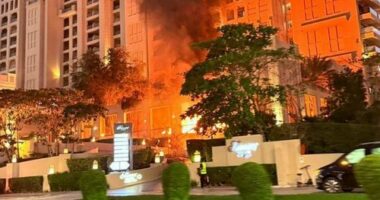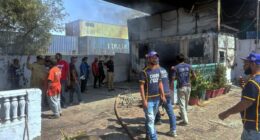Share this @internewscast.com
Over 200 firefighters are battling an uncontrollable wildfire on Crete, Greece’s largest island and a popular tourist destination, prompting officials to initiate large-scale evacuations.
The blaze ignited on Wednesday afternoon close to Ierapetra, a town situated on the island’s southeastern coast, during a period of abnormally high temperatures, ranging from 3 to 5 degrees Celsius (5.4 to 9 Fahrenheit) above the norm, combined with gale-force winds reaching approximately 50 miles per hour.
These conditions are fueling “new outbreaks, complicating firefighting efforts,” stated Fire Department spokesperson Chief Vasilios Vathrakoyannis in a statement on Thursday.

More than 230 firefighters, along with 46 vehicles and 10 helicopters have been deployed to fight the blaze, according to fire officials.
The flames have spread rapidly, reaching homes as well as hotels and other tourist accommodations.
Authorities asked residents of four settlements to evacuate and move toward Ierapetra. About 1,500 people have been evacuated so far, according to the Greek public broadcaster ERT.
The Ierapetra municipality has converted an indoor training centre facility into a makeshift camp, where hundreds of tourists and residents who abandoned their homes spent the night Wednesday.
The police, medical services and the coast guard have all been called to the area.
“We are entering the third and most difficult month of the fire season,” Vathrakoyannis said.

July is typically the hottest month in Greece and is often accompanied by strong winds.
“These conditions favour the spread of fires and increase their danger,” he said.
Wildfires have ripped through other European countries this week as the continent endures a brutal heat wave.
Tens of thousands were evacuated in Turkey as blazes ripped through the western Izmir and Manisa provinces and southern Hatay province, damaging nearly 200 homes.
Blazes also broke out in France and in Spain, where two people died.
Europe experiences wildfires every year, but they are becoming more intense and frequent due to human-caused climate change, which fuels heat and drought, both helping set the stage for fierce, destructive fires.








